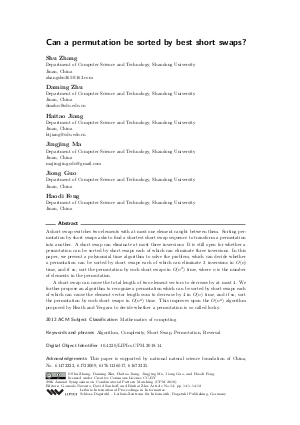Can a permutation be sorted by best short swaps?
Authors Shu Zhang, Daming Zhu, Haitao Jiang, Jingjing Ma, Jiong Guo, Haodi Feng
-
Part of:
Volume:
29th Annual Symposium on Combinatorial Pattern Matching (CPM 2018)
Part of: Series: Leibniz International Proceedings in Informatics (LIPIcs)
Part of: Conference: Annual Symposium on Combinatorial Pattern Matching (CPM) - License:
 Creative Commons Attribution 3.0 Unported license
Creative Commons Attribution 3.0 Unported license
- Publication Date: 2018-05-18
File

PDF
LIPIcs.CPM.2018.14.pdf
- Filesize: 427 kB
- 12 pages
Document Identifiers
Subject Classification
ACM Subject Classification
- Mathematics of computing
Keywords
- Algorithm
- Complexity
- Short Swap
- Permutation
- Reversal
Metrics
- Access Statistics
-
Total Accesses (updated on a weekly basis)
0Document
0Metadata
Abstract
A short swap switches two elements with at most one element caught between them. Sorting permutation by short swaps asks to find a shortest short swap sequence to transform a permutation into another. A short swap can eliminate at most three inversions. It is still open for whether a permutation can be sorted by short swaps each of which can eliminate three inversions. In this paper, we present a polynomial time algorithm to solve the problem, which can decide whether a permutation can be sorted by short swaps each of which can eliminate 3 inversions in O(n) time, and if so, sort the permutation by such short swaps in O(n^2) time, where n is the number of elements in the permutation. A short swap can cause the total length of two element vectors to decrease by at most 4. We further propose an algorithm to recognize a permutation which can be sorted by short swaps each of which can cause the element vector length sum to decrease by 4 in O(n) time, and if so, sort the permutation by such short swaps in O(n^2) time. This improves upon the O(n^2) algorithm proposed by Heath and Vergara to decide whether a permutation is so called lucky.
Cite As Get BibTex
Shu Zhang, Daming Zhu, Haitao Jiang, Jingjing Ma, Jiong Guo, and Haodi Feng. Can a permutation be sorted by best short swaps?. In 29th Annual Symposium on Combinatorial Pattern Matching (CPM 2018). Leibniz International Proceedings in Informatics (LIPIcs), Volume 105, pp. 14:1-14:12, Schloss Dagstuhl – Leibniz-Zentrum für Informatik (2018)
https://doi.org/10.4230/LIPIcs.CPM.2018.14
BibTex
@InProceedings{zhang_et_al:LIPIcs.CPM.2018.14,
author = {Zhang, Shu and Zhu, Daming and Jiang, Haitao and Ma, Jingjing and Guo, Jiong and Feng, Haodi},
title = {{Can a permutation be sorted by best short swaps?}},
booktitle = {29th Annual Symposium on Combinatorial Pattern Matching (CPM 2018)},
pages = {14:1--14:12},
series = {Leibniz International Proceedings in Informatics (LIPIcs)},
ISBN = {978-3-95977-074-3},
ISSN = {1868-8969},
year = {2018},
volume = {105},
editor = {Navarro, Gonzalo and Sankoff, David and Zhu, Binhai},
publisher = {Schloss Dagstuhl -- Leibniz-Zentrum f{\"u}r Informatik},
address = {Dagstuhl, Germany},
URL = {https://drops.dagstuhl.de/entities/document/10.4230/LIPIcs.CPM.2018.14},
URN = {urn:nbn:de:0030-drops-86957},
doi = {10.4230/LIPIcs.CPM.2018.14},
annote = {Keywords: Algorithm, Complexity, Short Swap, Permutation, Reversal}
}
Author Details
References
-
V. Bafna and P. A. Pevzner. Genome rearrangements and sorting by reversals. Siam Journal on Computing, 25(2):272-289, 1993.

-
Piotr Berman, Sridhar Hannenhalli, and Marek Karpinski. 1.375-approximation algorithm for sorting by reversals. Lecture Notes in Computer Science, pages 200-210, 2002.

-
Guillaume Bourque and Pavel A. Pevzner. Genome-scale evolution: Reconstructing gene orders in the ancestral species. Genome Research, 12(1):26-36, 2002.

-
Alberto Caprara. Sorting permutations by reversals and eulerian cycle decompositions. Siam Journal on Discrete Mathematics, 12(1):91-110, 1999.

-
Xuerong Feng, Ivan Hal Sudborough, and Enyue Lu. A fast algorithm for sorting by short swap. In Proceeding of the 10th IASTED International Conference on Computational and Systems Biology, pages 62-67, 2006.

- Gustavo Rodrigues Galvão and Zanoni Dias. Approximation algorithms for sorting by signed short reversals. In Proceedings of the 5th ACM Conference on Bioinformatics, Computational Biology, and Health Informatics, BCB '14, Newport Beach, California, USA, September 20-23, 2014, pages 360-369. ACM, 2014. URL: http://dx.doi.org/10.1145/2649387.2649413.
-
Gustavo Rodrigues Galvão, Orlando Lee, and Zanoni Dias. Sorting signed permutations by short operations. Algorithms for Molecular Biology, 10(1):1-17, 2015.

-
Sridhar Hannenhalli. Transforming cabbage into turnip: polynomial algorithm for sorting signed permutations by reversals. Journal of the Acm, 46(1):1-27, 1999.

-
L. S. Heath and J. P. Vergara. Sorting by short swaps. Journal of Computational Biology A Journal of Computational Molecular Cell Biology, 10(5):775-89, 2003.

-
Mark R. Jerrum. The complexity of finding minimum-length generator sequences. In Colloquium on Automata, Languages and Programming, pages 270-280, 1984.

-
Haim Kaplan, Ron Shamir, and Robert E. Tarjan. A Faster and Simpler Algorithm for Sorting Signed Permutations by Reversals. Society for Industrial and Applied Mathematics, 1999.

-
J. Kececioglu and D. Sankoff. Exact and approximation algorithms for sorting by reversals, with application to genome rearrangement. Algorithmica, 13(1-2):180-210, 1995.

-
P Pevzner and G Tesler. Genome rearrangements in mammalian evolution: lessons from human and mouse genomes. Genome Research, 13(1):37-45, 2003.

-
G. P. Pradhan and P. V. Prasad. Evaluation of wheat chromosome translocation lines for high temperature stress tolerance at grain filling stage. Plos One, 10(2):1-20, 2015.

-
D. Sankoff, G. Leduc, N. Antoine, B. Paquin, B F Lang, and R. Cedergren. Gene order comparisons for phylogenetic inference: evolution of the mitochondrial genome. Proceedings of the National Academy of Sciences of the United States of America, 89(14):6575-6579, 1992.

-
G. A. Watterson, W. J. Ewens, T. E. Hall, and A. Morgan. The chromosome inversion problem. Journal of Theoretical Biology, 99(1):1-7, 1982.

